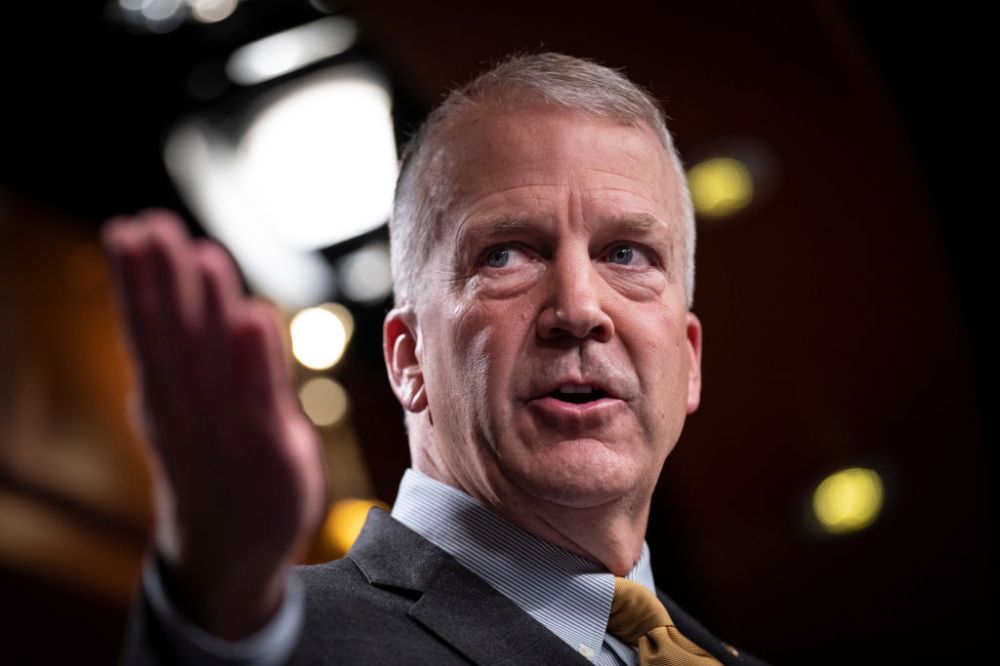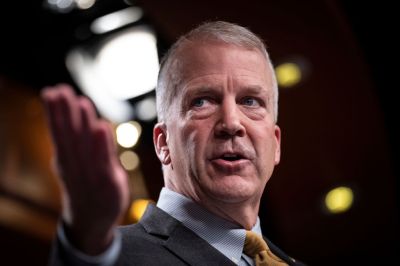Good afternoon. We have a jam-packed edition of Uphill for you today. Thanks to the spy balloon that crossed the United States last week, China was the focus on the Hill this week, but two high-profile House GOP committees began their investigatory work too.
Balloon Could Add Fuel to Investment Screening Debate
U.S. officials are investigating whether the Chinese spy balloon that traversed the United States last week was made with components from American companies, according to one senator. If it was, lawmakers may revive efforts to screen outbound investments in China.
“American companies shouldn’t be helping build spy satellites that are used against their own citizens,” Sen. Dan Sullivan, an Alaska Republican, told reporters Thursday after a classified briefing. “Maybe there’s nothing. Somebody asked about it, and nobody in that briefing said, ‘Oh, it’s not a problem.’”
Lawmakers came close to a deal last year to establish a new review board to restrict American investments abroad involving “critical and emerging” technologies and important supply chain sectors such as semiconductors, artificial intelligence, and quantum computing. But some businesses pushed back, and several Republicans raised fears about giving the government too much power to block deals.
As we wrote then, an interagency committee exists to review foreign investment in the United States, but no equal government structure exists to monitor—and, if needed, block—U.S. investments abroad. The Biden administration, meanwhile, has been preparing its own rules to curb American investments in China. The New York Times reported yesterday that the plan is largely complete and could be rolled out within the next two months.
Even if the White House releases its own plan, members of Congress may still want to solidify a permanent legislative approach that could become part of larger China policy negotiations. Senate Foreign Relations Committee Chairman Bob Menendez said during a hearing Thursday that he has spoken with the top Republican on the panel, Sen. Jim Risch, about a new comprehensive China policy bill for this Congress, which could include elements left out of last year’s CHIPS Act.
During Thursday’s hearing, Sen. Marco Rubio, a Florida Republican, argued that the gamble America made more than two decades ago that China would become more democratic and more peaceful amid free trade between the two countries has failed.
“We’re now entering a new era,” he said. “What is that new era? What is our vision now for that world?”
Deputy Secretary of State Wendy Sherman said it’s a difficult question to answer. But it’s clear there is a threat: “Our way of life, our democracy, our belief and our values in the rules-based international order is being challenged,” she told senators. “And we have to meet that challenge.”
China Repression Tip Line?
Sen. Jeff Merkley, an Oregon Democrat, has been pushing the FBI for several months to stand up a tip line for Chinese Americans and others who are facing transnational repression by the Chinese government, separate from its general tip line.
“China is continuing to approach people here in the U.S. and threatening their families back home, and in some cases, executing those threats to intimidate everyone else,” Merkley told The Dispatch Thursday. “And we have to have a vociferous response to this.”
The FBI has been skeptical of the idea, Merkely said, but he believes the current generalized approach likely dissuades victims from coming forward. He wants China experts and Mandarin speakers ready to answer phone calls. Merkley said he has been working on drafting legislation to give guidance to the FBI. (He co-chairs the Congressional-Executive Commission on China, charged with monitoring human rights issues in China.)
Recent cases of intimidation in the U.S. and reports of Chinese police stations around the world have elevated the issue in Congress.
“I want to make sure that we understand it as well as possible from various human rights groups and from the FBI criminal side to try to make sure that whatever we put forward is an appropriate recommendation,” he said.
Shein in the Spotlight
Three senators are pressing a major fashion brand for answers about its potential ties to forced labor in China and a trade benefit that may allow companies to avoid scrutiny.
In a letter to Shein CEO Yangtian Xu on Thursday, Sens. Bill Cassidy, Elizabeth Warren, and Sheldon Whitehouse raised alarms over a November Bloomberg report that laboratory tests of Shein clothing shipped to the United States found the presence of cotton from Xinjiang, the region where Chinese officials are committing genocide against mostly Muslim ethnic minorities.
“We are concerned that American consumers may be inadvertently purchasing apparel made in-part with cotton grown, picked, and processed using forced labor,” the senators wrote.
Cotton products from Xinjiang have been banned from the United States since January 2021, and all imports touched by the region have been banned since June of last year under the Uyghur Forced Labor Prevention Act. But American customs officials are still building the resources needed to track supply chains and have struggled to keep all imports touched by the region out of the U.S.
Shein may also be using American trade laws to skirt scrutiny: Shipments with values below $800 are not subject to duties and the extra processing larger shipments face. Many of Shein’s shipments are small, going directly to consumers. Congress raised the comparatively generous threshold to $800 from $200 in 2015, an effort to boost small retailers and online commerce. The senators who wrote this week’s letter asked what percentage of the company’s shipments to America are imported under the threshold and for information about Shein’s supply chains and its previous audits of suppliers.
Lawmakers have increasingly questioned whether the threshold is allowing Chinese companies to skirt the import restrictions. Despite lobbying against changes from shipping and e-commerce companies, Democratic Rep. Earl Blumenauer pushed last year for legislation blocking Chinese shipments from having access to the benefit and requiring Customs and Border Patrol to collect more information about shipmens meeting the “de minimis” standards.
Weaponization of Federal Government Panel Hits Big Tech, DOJ, and Media
Audrey tuned into the first hearing of House Republicans’ new Select Subcommittee on the Weaponization of the Federal Government, which had its first public hearing Thursday:
During the committee’s three-and-a-half hour meeting, Republicans interviewed two panels of witnesses about a variety of topics, including social media censorship of conservatives and whether federal agencies consistently weaponize law enforcement against Republicans.
The select committee heard from two panels of witnesses, including former FBI agents Nicole Parker and Thomas Baker, Washington University Law professor James Turley, GOP Sens. Chuck Grassley of Iowa and Ron Johnson of Wisconsin, and former Rep. Tulsi Gabbard, who recently left the Democratic Party.
“In my time in Congress, I have never seen anything like this,” Chairman Jim Jordan of Ohio said in his opening statement. “Dozens and dozens of whistleblowers, FBI agents coming to us, talking about what’s going on—the political nature at the Justice Department.” Jordan said the 11 Republicans on the subcommittee hope to “bring forward legislation that will help protect the American people” based on their findings.
The committee’s nine Democrats spent the hearing questioning the panel’s purpose, accusing Republicans of advancing conspiracy theories, wasting committee resources, and undermining Americans’ confidence in federal institutions. Many attempted to discredit Republican witnesses, grilling them on whether they thought January 6 was an act of terrorism or a legitimate act of First Amendment expression. Democrats’ sole witness was Rep. Jamie Raskin, a former member of the since disbanded House select committee that investigated the January 6, 2021, attack on the Capitol.
“This committee is designed to inject extremist politics into the justice system and to shield the MAGA movement from the legal consequences of their actions,” said Democratic Rep. Sylvia Garcia of Texas. “These political stunts undermine every agent, officer, prosecutor, law enforcement, and the entire justice system.”
Republicans spent the hearing pushing back on that claim. “People say: ‘You’re going after the FBI.’ What nonsense. We’re trying to protect the FBI,” said Republican Rep. Chris Stewart.
Jordan said the committee will hear from experts, government officials, members of the media, FBI whistleblowers, and “Americans who’ve been targeted by their government.”
The select committee will report its findings to Congress by January 5, 2025.
Republicans Take on Hunter Biden Twitter Controversy
Harvest followed this week’s House hearing about Twitter and Hunter Biden:
Republicans on the House Oversight Committee grilled former Twitter officials over the social media platform’s decision to limit the spread of a story about Hunter Biden in the lead-up to the 2020 presidential election.
The hearing provided an early glimpse into how Republicans will flex their new oversight powers to investigate President Joe Biden and his family.
Chairman James Comer, a Kentucky Republican, argued the incident proved collusion between the FBI and Twitter, which he said sought to censor a potentially politically damaging story for Biden ahead of the general election. Republicans have long complained about anti-conservative bias in Silicon Valley.
Twitter, Comer said, is “a private company that the federal government used to do what it cannot: limit the constitutional free exercise of speech.”
The witnesses, which included Twitter’s former head of trust and safety Yoel Roth and former chief legal officer Vijaya Gadde, admitted that tamping down on the story’s spread was a blunder that should have been reversed sooner. But they pushed back on accusations of government collusion.
“I am aware of no unlawful collusion with, or direction from, any government agency or political campaign on how Twitter should have handled the Hunter Biden laptop situation,” James Baker, a former lawyer for Twitter and former FBI employee, told lawmakers.
The witnesses also cited examples of the company bending and changing the rules for former President Donald Trump: Anika Collier Navaroli, a former Twitter employee, said the company tweaked its rules to avoid adding labels to some Trump tweets that ran afoul of company policy. In one 2019 tweet, Trump told a group of progressive Democratic congresswomen to “go back” and “fix the totally broken and crime infested places from which they come.”
Navaroli said Twitter had an internal rule that prohibited xenophobic sentiments, including the phrase “go back to where you came from,” but changed its policy.
The hearing got particularly heated when it turned to the Hunter Biden story (though cooled a bit after a power outage in the hearing room).
“You, ladies and gentlemen, interfered with the United States of America 2020 presidential election, knowingly and willingly,” Rep. Clay Higgins, a Louisiana Republican accused during Wednesday’s hearing. “It’s going to get worse because this is the investigation part. Later comes the arrest part.”
Rep. Lauren Boebert, a far-right Republican, said she doesn’t know “where the FBI ends and Twitter begins.”
Democrats, meanwhile, decried the hearing as a political stunt. But they weren’t particularly happy with Twitter either. Rep. Jamie Raskin, the ranking Democrat on the committee, said the company and other social media companies failed to do more to stop extremists from organizing online ahead of the January 6, 2021, Capitol insurrection.
Republicans’ investigation will continue. On Thursday, the committee announced it has sent letters to members of Biden’s family as part of its probe into Biden’s “involvement in his family’s business dealings.”







Please note that we at The Dispatch hold ourselves, our work, and our commenters to a higher standard than other places on the internet. We welcome comments that foster genuine debate or discussion—including comments critical of us or our work—but responses that include ad hominem attacks on fellow Dispatch members or are intended to stoke fear and anger may be moderated.
With your membership, you only have the ability to comment on The Morning Dispatch articles. Consider upgrading to join the conversation everywhere.